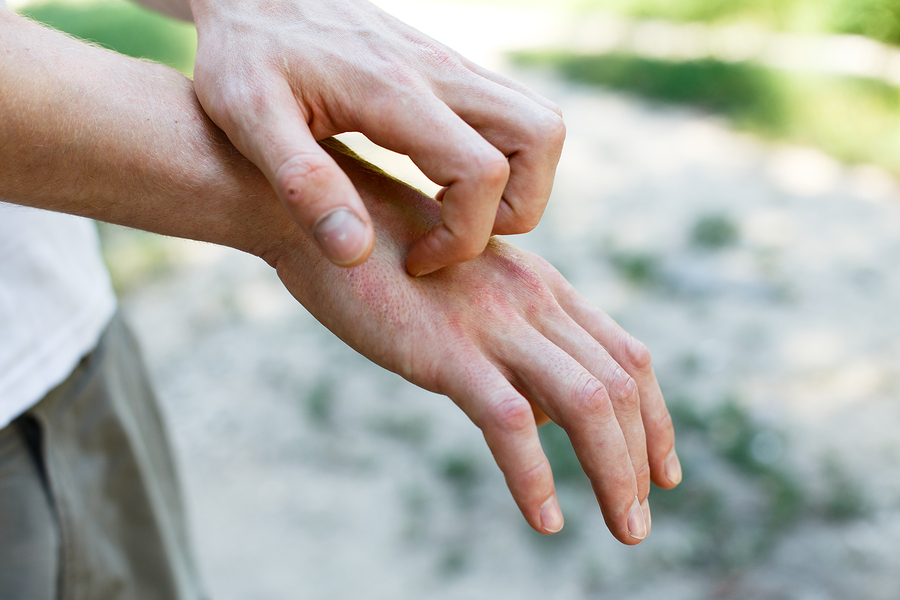How tell if your rash is contact dermatitis, eczema, psoriasis or hives
Consultant dermatologist Dr Juber Hafiji tells Liz Connor about four common skin conditions and how to spot them.
Most of us will get the odd bit of dry or inflamed skin from time to time – but how do you know if it’s just a fleeting normal reaction, or the symptom of a skin condition?
The British Skin Foundation says around 60% of Brits have suffered from a skin disease or skin allergy at some point in their life, and research shows that millions of people seek medical advice about a skin condition each year – so they are very common.
They can have different causes too. Some occur as an allergic reaction, and others might be an auto-immune response, for example. Four of the most common to look out for are eczema, psoriasis, contact dermatitis and hives, which can affect people of all ages. Remember, if you’re experiencing ongoing or unusual symptoms, it’s always best to get things checked with a doctor and seek an accurate diagnosis and advice.
We spoke to Dr Juber Hafiji, an expert dermatologist, to find out more…
Eczema

Eczema can cause patches of dry and irritated skin
“Eczema is a chronic inflammatory skin condition that can affect all age groups, men and women alike,” explains Dr Juber. “Atopic eczema is the most common type, which usually presents in childhood, can become chronic and persist in adult life.”
Juber explains that, in many cases, irritants and allergens can trigger ‘flare-ups’ and cause the skin to react. “Allergens can be anything from food groups, soaps, pollen, dust mites, smoke or even dandruff,” he explains. “Extreme hot or cold temperatures, stress and lack of sleep can all contribute to too.
“Eczema is usually characterised by having dry skin for a period of time, alongside patches of irritated, itchy and red skin. The skin can sometimes peel back making you vulnerable to infection too,” he adds.
Treatment of eczema varies, and if symptoms are ongoing then it is always best to see a specialist for personalised advice. Juber also recommends applying a suitable emollient (such as Cetraben Cream, from £4.99 for 50ml, Boots) daily, to soothe affected areas and help protect the skin.
“Other techniques for eczema management include keeping a ‘trigger’ diary to identify allergens, using mindfulness techniques to reduce stress, wearing loose cotton materials and taking steps to avoid scratching the skin – which can make symptoms worsen.”
Contact dermatitis

Anyone can experience contact dermatitis
“This form of eczema that tends to be much more transient,” says Juber. He explains that it’s caused by an inflammatory reaction to an irritant or allergen, usually occurring in one place, such as from using soaps, laundry products and wearing metal jewellery.
“The symptoms include red, blistered, dry and cracked skin. In some more severe cases, and if not treated, the skin may weep too,” says Juber. “The main difference between eczema and contact dermatitis is that if you avoid the irritant or allergen, your skin barrier function will resume to normal, the irritation will subside and you will not get another flare-up in the same area.”
The most obvious advise is to avoid your triggers. For instance, if you frequently get a reaction on your hands, try changing the soap you use and see if that helps.
Psoriasis

Psoriasis causes dry lesions on the body
Psoriasis is characterised by raised, dry, red skin lesions or patches, which may be covered in silvery scales. It’s a long-term condition that generally occurs in episodes, alternating between flare-ups and periods where symptoms calm down, and can vary greatly in severity.
“Severe flare-ups can almost look like a large red and crusting scab,” says Juber. “Not only can psoriasis affect the skin, it can also commonly occur on scalp, nails and in some cases it can cause psoriatic arthritis. It is the thickness of the skin and scaling that will often tell psoriasis and eczema apart.”
There’s no cure for psoriasis but Juber assures that there are management techniques which will help you keep symptoms under control.
“Depending on your symptoms and history of the condition, topical creams can help keep skin hydrated and reduce irritation. There are also a number of injections that can help those with psoriasis, reducing and preventing symptoms.” Some individuals may be treated using phototherapy – a treatment where a special type of light is shone onto the affected area.
Hives

A hives rash is very common
Hives are medically known as urticaria, and affect one in five people at some point in their lives. “Hives will either appear as a large, red itchy rash or raised red bumps or spots,” says Juber. “They may sting and burn – a similar sensation to a nettle sting.”
Hives are generally a sign of an allergic reaction (if they occur suddenly, it’s important to keep an eye out for any indication of a serious reaction occurring, such as swelling of the mouth and airways and any breathing difficulties, as these are a medical emergency).
“Not only could this be a response to an allergen, it could be due to an infection or a reaction to medication,” Juber adds.
In most cases, the reaction will calm down or disappear after a few hours or a couple of days. But if symptoms don’t subside within 48 hours, and/or other symptoms are occurring too, it’s always recommended to seek medical advice.
The Press Association
Latest posts by The Press Association (see all)
- Could brisk walking boost your heart? - April 16, 2025
- Best spring-to-summer plants to fill the colour gaps - April 15, 2025
- Catherine tells how ‘spiritual’ connection with nature gives her peace in busy world - April 15, 2025
- Why weeds are worth cultivating – and eating - April 14, 2025
- 5 top tips for cleaning your tech, from phones to laptops - April 14, 2025




















